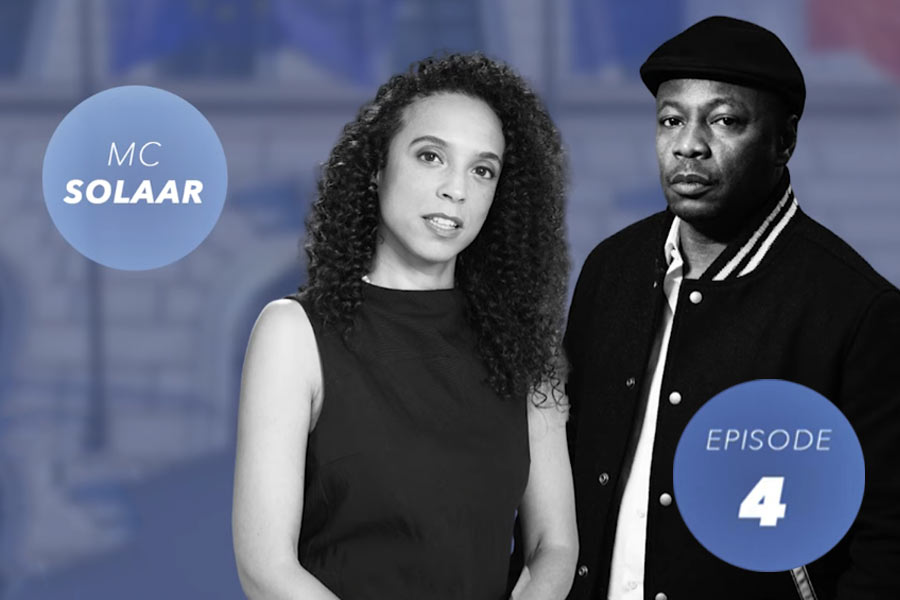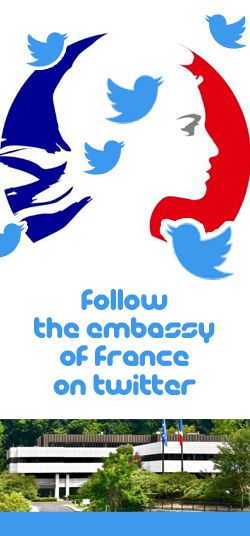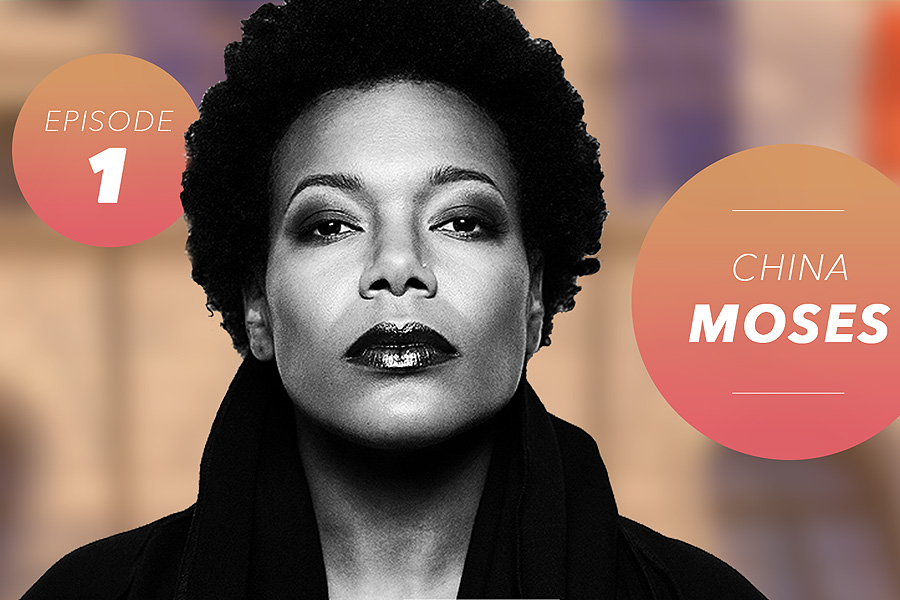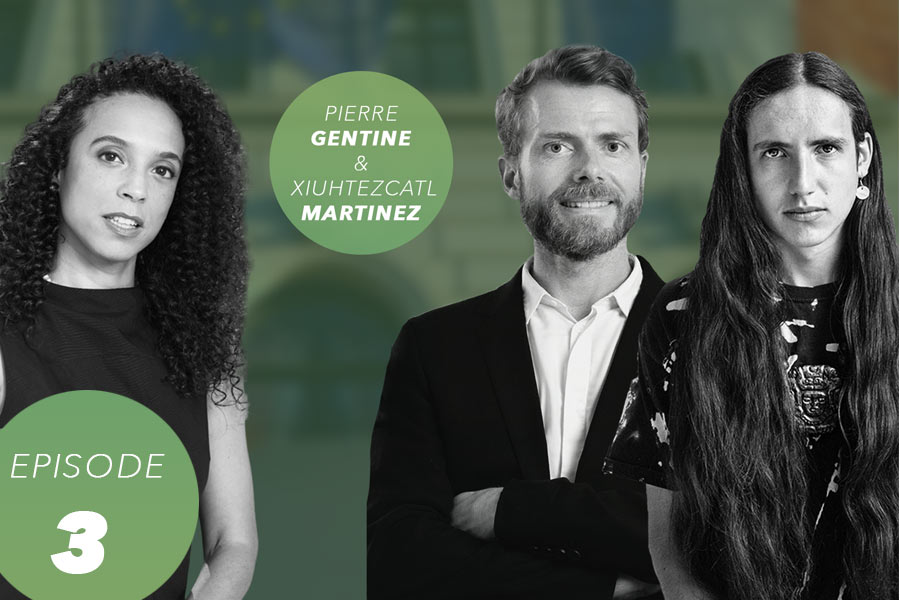A Propos [e04] – French rap: A New York conversation with MC Solaar
A Propos [e04] – French rap: A New York conversation with MC Solaar
A Propos [e04] – French rap: A New York conversation with MC Solaar
SUMMARY
While in New York, Claude M'Barali, better known as MC Solaar, stopped by the Consulate General of France for a special interview as part of our podcast A Propos. A must in French music and a great literary talent, this artist who democratized rap music in France talks about his brilliant career and what inspires him today.
This episode of "A Propos" is exceptionally in French. Read the transcript in English below.

Transcript
In order to facilitate the reading and to be better adapted to the written format, the remarks reported in this exchange were subjected to slight modifications and some questions available in the audio format were cut out.
Garance Choko: MC Solaar, welcome to the Consulate General of France in New York. Your music is known and appreciated by a large part of French society. One can even say that it goes beyond the social and political spheres. You have been recognized by the French Academy, which awarded you the Grande médaille de la chanson française. You have received several gold and platinum discs and you were a member of the jury of the Cannes Film Festival. What elements of your music, your personality and your sensitivity make your work so universal? How do you manage to touch so many people?
MC Solaar: I think what touched France was that I didn’t make sectarian music. It’s simple, when I started, I was hanging out at rap parties, but I was also at school. And I thought I should be able to talk to my school friends. So I didn’t do what they call slang or verlan. I wanted everyone to be able to understand. There were already a lot of people who spoke in slang or about very particular subjects. I tried to find my own voice. As a student, I did as I did at school: I tried to mix the content and the form. And I believe this is what people liked. Because of that, my lyrics reached a wider audience and were not only understood by those we hung out with at parties. The fact that I was still in school at the time allowed me to write a little differently. I think that’s one of the key things.
GC: By the way, you have a passion for philosophy, don’t you? Did you study it after high school too?
MCS: Yes. I was a literary major with an option to have class on Saturday which added three extra hours. That was cool. Socrates, Plato, Aristotle… it was great! It’s great because philosophy is a mathematical game, it’s a game with the brain. I put names of philosophers in my pieces because it allows me to think and understand in general. It’s very important that in any discipline, you do a little bit of philosophy.
GC: Besides, in your songs, you often deal with metaphysical subjects, good, evil, Mephistopheles, the light, as well as the darker sides.
MCS: That’s because, as a young man, I believed that there was good and evil. I was Manichean. And then especially, in order to send a message, to steer people a little bit towards something positive, you have to be extremely cartoonish. Every time I do something a bit serious, I rely on good and evil, on biblical episodes, on Mephistopheles, so it’s very caricatural. Now, people go on the Internet, they understand everything. But before, it was good to make the difference, to be caricatural. It often makes for epic songs when I do that, it allows people to be in the heroic fantasy.
GC: It’s true that you “capture” the heroic and the epic very well. That’s something that really characterizes your songs and your style, and again it touches on the universal.
MCS: Yes. Always. I like when you see the struggle, when you see the feelings. I have done several songs that deal with these themes: Impact avec le Diable, L’attrape-nigaud, Solaar pleure, Guérilla. All of this composes with good and evil. What’s the point? To make people choose. I’m in the camp that fights against evil. I think that’s good.
GC: You talk a lot about the positive side, bringing a positive aspect, bringing positive values. You talk about hope, you talk about educating – but in a humble way – your audience to think. You give a lot to your audience. Where do you think you get this role and desire to “give” from?
MCS: I think it was five or six of my teachers who inspired me. From kindergarten to now, I have no regrets. When I look at what they taught me, it’s values, a way of throwing my words around… Don’t crush people, don’t be for the law of the strongest… It’s a good thing I had these teachers, because otherwise I would have regretted everything I wrote. Some of my songs are 30 years old, or 25 or 18 or 12, and I don’t change a single comma. Because I had teachers that taught me some really good “stuff”.
GC: Through your music, through your songs, you talk about war, you talk about imperialism, you talk about the human condition… . What is your process of choosing a subject? Today, what are the subjects that animate you?
MCS: Since I was young I tried never to talk about current events. Because it changes. I never want to be an editorial writer. At any time. I prefer to see things with hindsight. I am spontaneous: my texts are never premeditated. You’re in the studio, and then your pen takes you somewhere. I always try not to do the same thing twice, every album. If I do one subject that’s about fall, I’ll do another one that’s more winter, another one that’s more spring…
GC: It’s interesting because you have this desire for novelty, for pure creativity. Today there is often a desire to repeat, to try to improve what is. But what really drives you is this kind of spark of creation, originality, fresh curiosity. Can you tell us a little more about it?
MCS: It’s simple; you just have to meet someone. A musician, anyone in the studio. There will be the person’s idea. You just have to be in the same place. There is an idea that meets an idea and every time something happens. We don’t think the same. If a person lives in the 6th arrondissement, he’s going to send you 6th district vibes and do something elegant. You’ll meet someone who likes funk and you won’t necessarily write the same thing, even though you said almost nothing to each other at the time of the music’s creation, but you want to please him, you want to please yourself… The important thing is to listen. To put it simply: you can have cheese on one side and bread on the other, but it’s better if you put them together because you have a sandwich. You’ve created something.
GC: You inherited some of the richest cultures in the world, your family being from Senegal and Chad. And you grew up and developed in France, in Paris, which is also a great cultural center. You have made a profound contribution to French culture. What does it mean to you to be a French hip hop artist?
MSC: You have to draw all the strength from what you are. I was born in Senegal but at six months I was in France so I couldn’t get the good Senegalese vibes. And Chad, I knew it only briefly when I went there in 2009. So really I am very French. But I always put African vibes in my sounds because when I was in Africa I understood things by talking with people. Let’s say I’m 97% French, but fortunately I haven’t closed myself off culturally.
GC: You have collaborated with many American hip hop artists such as Missy Elliot, Guru and others. What similarities and differences have you noticed? What have you learned from each other?
MSC: With the ones I worked with I think we were exactly on the same PH, on the same page. You think that American rappers are stronger, that they are arrogant, but the ones I worked with were amazing. Guru for example, it was a great discovery. I don’t know if he’s older or younger than me but he gives real advice. We were all really on the same page.
GC: Thank you so much for answering these questions, it was an honor talking with you. Thank you very much for everything.
MSC: Muchas gracias.
GC: De nada!
Related posts






